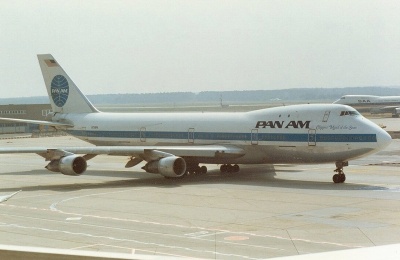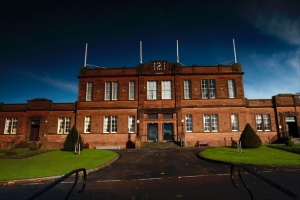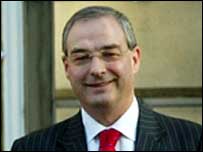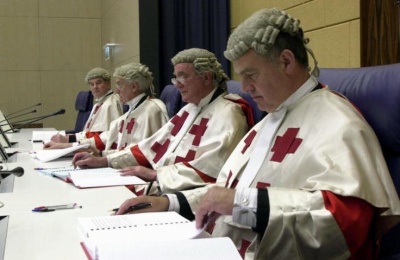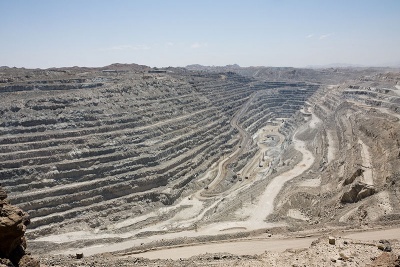Pan Am Flight 103
| A synthesis page at The How, Why and Who of Pan Am Flight 103 summarises the material in this page and other related pages.. |
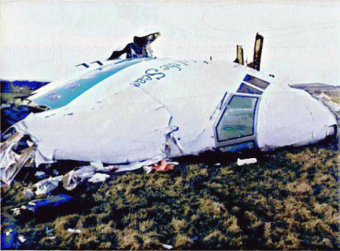 Wreckage of "Clipper Maid of the Seas" Cockpit section near Tundergarth Church | |
| Date | 21 December 1988 |
|---|---|
| Coordinates | 55°6′55.99″N 3°21′30.69″W / 55.1155528°N 3.3585250°W Fatal error: The format of the coordinate could not be determined. Parsing failed. |
| Type | |
| Deaths | 270 |
| Survivors | 0 |
| Interest of | 'SlimVirgin', Safia Aoude, Juval Aviv, Robert Black, Ludwig De Braeckeleer, John Urquhart Cameron, William Chasey, Marina de Larracoechea, Adam Larson, Charles Norrie, Pierre Péan, George Thomson, Barry Walker |
| Subpage | •Pan Am Flight 103/Cover-up •Pan Am Flight 103/Fatal Accident Inquiry •Pan Am Flight 103/The Trial •Pan Am Flight 103/Unanswered questions |
| Description | When Pan Am Flight 103 exploded over Lockerbie, Scotland on 21 December 1988, killing all 259 passengers and crew on board, news reports cited UN Assistant Secretary-General, Bernt Carlsson, as its highest-profile victim. US and British intelligence operatives, posing as Lockerbie investigators, ignored the evident targeting of the UN diplomat and instead focused on the jumbo jet. With the result that the wrong country was blamed and an innocent person convicted of the Lockerbie bombing. |
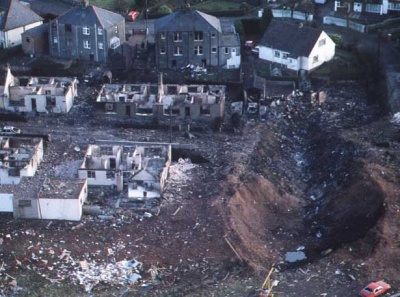
On 21 December 1988 Pan Am Flight 103, a Boeing 747-121 named "Clipper Maid of the Seas", was on a scheduled transatlantic flight from London's Heathrow Airport to New York's JFK International Airport when there was an explosion on board. The aircraft broke up over the Scottish town of Lockerbie (Map), killing all 243 passengers and 16 crew members. Eleven people in Lockerbie were killed by large sections of the plane which fell in and around the town, bringing total fatalities to 270.
Thirteen years later, on 31 January 2001, a juryless trial convicted Libyan Abdelbaset Ali Mohmed Al Megrahi of involvement in the bombing and sentenced him to life imprisonment in Scotland and acquitted his co-defendant, Lamin Khalifah Fhimah. Megrahi's appeal was refused on 14 March 2002 by a panel of five Scottish judges[1] but on 28 June 2007, the Scottish Criminal Cases Review Commission granted Megrahi leave for a second appeal on the basis of evidence that a miscarriage of justice could have occurred.[2] After a delay of two years appeal proceedings began at Edinburgh's Court of Criminal Appeal on 28 April 2009. However, Megrahi abandoned the second appeal on 18 August 2009. Two days later the Scottish Justice Secretary Kenny MacAskill released Megrahi on compassionate grounds, as suffering from terminal prostate cancer, and he returned to Libya on 20 August 2009.[3]
Many people, including Wikispooks editor, Patrick Haseldine dispute Megrahi's guilt,[4] suggesting that Lockerbie was an assassination of Bernt Carlsson, and has petitioned the UN Secretary General, Ban Ki-moon to investigate further.[5]
Contents
- 1 Fatal Accident Inquiry
- 2 Official Narrative
- 3 Geopolitical Background
- 4 The Investigation
- 5 The Trial
- 6 Post-Trial developments
- 7 Alternative Possibilities
- 8 High profile victims
- 9 E-petition to HMG
- 10 Media cover-up
- 11 A Pan Am Flight 103 victim on Wikispooks
- 12 Related Documents
- 13 The Official Culprit
- 14 See also
- 15 Video
- 16 References
Fatal Accident Inquiry
The Department of Transport Air Accidents Investigation Branch (AAIB) submitted a detailed 54-page report on the accident to Cecil Parkinson, Secretary of State for Transport, on 6 August 1990.[6] Informed by the AAIB report, John Stuart Mowat QC, Sheriff Principal of South Strathclyde, Dumfries and Galloway, conducted a Fatal Accident Inquiry (FAI) into the Lockerbie disaster at Easterbrook Hall, Crichton Royal Hospital, Dumfries from 1 October 1990 to 13 February 1991. In his FAI report, Sheriff Principal Mowat determined:
- (1) That 16 named crew members died from multiple injuries at about 1905 hours on Wednesday 21 December 1988 at or near Lockerbie, Dumfriesshire in the course of their employment with Pan American World Airways as members of the flight crew of Pan American World Airways Flight 103 on Boeing 747-121 Registration N739PA en route from London Heathrow Airport to John F Kennedy Airport, New York.
- (2) That 243 named passengers, including Bernt Wilmar Carlsson (born on 21 November 1938 and residing at Apartment 30, 207 West 106th Street, New York, New York 10025, USA), who were passengers on said aircraft, died from multiple injuries at about 1905 hours on Wednesday 21 December 1988 at or near Lockerbie, Dumfriesshire.
- (3) That 11 named Lockerbie residents all died from multiple injuries and/or severe burning at about 1905 hours on Wednesday 21 December 1988 at Sherwood Crescent, Lockerbie, Dumfriesshire.
- (4) That the cause of all the said deaths was the detonation of an improvised explosive device located in luggage container AVE 4041 situated on the left side of the forward hold of said aircraft Registration N739PA. The detonation caused the nose and flight deck of the aircraft to become detached and the rest of the aircraft to descend out of control and to break up, eventually crashing into the ground at or near Lockerbie. The wing and centre fuselage section crashed in the Sherwood Crescent area of the town and caused the deaths referred to in Finding (3) hereof. The deaths referred to in Findings (1) and (2) hereof resulted from injuries sustained either as a direct result of the explosion and the disintegration of the aircraft or from impact with the ground.
- (5) That the said device consisted of Semtex-type plastic explosive concealed in a Toshiba radio-cassette player contained in a Samsonite suitcase which was one of the pieces of baggage placed in the said luggage container by employees of Pan American World Airways at Heathrow Airport, London. The contents of said container consisted of six or seven pieces of baggage collected from the interline shed and about thirty five pieces of baggage which had been unloaded from Pan American flight 103A from Frankfurt to Heathrow and were labelled as destined for airports in the United States, including JFK Airport New York and Detroit. The bags from the interline shed had been checked in by passengers booked on flights into Heathrow on airlines other than Pan American World Airways to connect with Pan American Flight 103 to New York.
- (6) That the primary cause of the said deaths was a criminal act of murder.
- (7) That the aircraft involved arrived at Heathrow at about 1210 hours on 21 December 1988 from San Francisco and was under constant guard until it left Heathrow as Flight 103 that evening. The aircraft was fully airworthy when it took off from Heathrow at 1825 hours.
- (8) That the bags transferred from Pan American Flight 103A were taken directly from that aircraft in the said baggage container to Pan American Flight 103. They were not counted or weighed so as to check that they corresponded to the baggage checked in at Frankfurt by passengers proceeding to New York or reconciled in any other way with such passengers. They were not x-rayed at Heathrow.
- (9) That the suitcase containing the said explosive device was among the said pieces of baggage transferred from Pan American Flight 103A and was unaccompanied both on the flight from Frankfurt to Heathrow and on the flight from Heathrow.
- (10) That the said suitcase probably arrived at Frankfurt on a flight or an airline other than Pan American and so was interlined to Pan American there. It was loaded on to and allowed to fly on Flight 103A without being identified as an unaccompanied bag.
- (11) That bags interlined to Pan American at Heathrow were subjected to x-ray screening but there was no reconciliation procedure there to ensure that interline passengers and their baggage travelled on the same aircraft. The same procedure probably applied at Frankfurt.
- (12) That Khaled Nazir Jaafar originated as a passenger at Frankfurt. He checked in two bags, neither of which was the suitcase containing the device and neither of which contained any traces of illegal drugs. There was nothing to connect him with the said suitcase containing the device.
- (13) That in 1988 it was accepted (a) that there was a danger of an explosive device being concealed in a piece of baggage and loaded on to an aircraft; (b) that such a piece of baggage was likely to be unaccompanied; and (c) that such a bag was likely to be introduced by being interlined at a particular airport from another airline and that the person introducing it would not check in as a passenger at that airport.
- (14) That positive passenger/baggage reconciliation was recognised as an important element in any system designed to prevent the carriage of an unaccompanied bag on an aircraft.
- (15) That the limitations of x-ray screening as a means of detecting plastic explosives contained in electronic equipment were generally recognised as at December 1988.
- (16) That in all the circumstances the procedure of transferring baggage from Flight 103A to Flight 103 without any security check involved a substantial risk that an unaccompanied bag containing an explosive device would be so transferred.
- (17) That it would have been a reasonable precaution to have instituted or reverted to a positive passenger/baggage reconciliation procedure in relation to interline baggage at Frankfurt designed to detect the presence of any unaccompanied bag. Such a precaution might have avoided the deaths.
- (18) That in the absence of such a procedure at Frankfurt, it would have been a reasonable precaution to have instituted a positive passenger/baggage reconciliation procedure in relation to bags transferred from Flight 103A to Flight 103, either by counting the bags so transferred or by a physical match. Such a precaution might have prevented the deaths.
- (19) That reliance on x-ray screening alone in relation to interline baggage at Heathrow and Frankfurt was a defect in a system of working which contributed to the deaths.
- (20) That the Department of Transport’s direction (Production 71) and the Circulars (Productions 21/1 and 64), as interpreted by the Department, afforded insufficient protection against the possibility that an undetected unaccompanied bag would be transferred from Flight 103A to Flight 103.[7]
Mowatt's flawed finding
Lockerbie campaigners Barry Walker and Morag Kerr have demonstrated Sheriff Principal Mowatt's finding number (5) - that the bomb suitcase had arrived from Frankfurt on the feeder flight Pan Am 103A - to be incorrect:
- Detective Chief Superintendent John Orr’s supposition that the two bags seen by baggage handler David Bedford were "Interline" bags, the forensic tests that purported to eliminate these bags and the speculation that these bags had been re-arranged were all essentially irrelevant. Indeed the attempt to identify the origin of the primary suitcase from identifying the bags around it was deeply flawed as it assumed the primary suitcase was introduced into the system at the same point.
- There was only one way to properly identify and eliminate the brown/maroon Samsonite seen by Bedford and that was to recover it, examine its contents and link it to a particular passenger. If DCS John Orr believed the Samsonite seen by Bedford was an Interline bag then it should have been recovered and linked to a specific Interline passenger.
- The logic is irrefutable. If the Samsonite suitcase seen in container AVE4041 was not otherwise recovered then it must have been the primary suitcase. As it was seen long before the arrival of flight PA103A then the official scenario (on which Megrahi was convicted) must be untrue.[8]
An under-reported inquiry
There has been one, only one, public hearing in Scotland of the facts about Lockerbie. This was the Fatal Accident Inquiry heard by Sheriff John Mowat in 1990, two years after the disaster. The choice of location seems, in retrospect, grimly appropriate: the recreation hall of a psychiatric hospital, converted into a courtroom with seating for 400. When I turned up one morning and reported to the media centre, I found it deserted. There were dozens of desks and cubicles for the international press, but only a handful of them had ever been occupied and there was no need to connect the telephones.
Visiting this ghostly place was a strange experience. In the courtroom itself, the anticipated throng of relatives and interested parties had never materialised: the public benches were deserted. Heavy, dark green curtains, tightly drawn, enabled the proceedings to be conducted in an atmosphere of stygian gloom. The symbolism was thus complete: in a room shedding no natural light, witnesses presented their testimony to an empty auditorium and, beyond, to a world that had seemingly lost interest. But it is instructive to look back at that under-reported inquiry from the distance of almost quarter of a century – if only for proof that the truth about Lockerbie will probably never be known.[9]
Official Narrative
- Full article: Lockerbie Official Narrative
- Full article: Lockerbie Official Narrative
In August 2001, Scottish Lord Advocate Colin Boyd presented what might be considered the definite statement of the Lockerbie Official Narrative at a conference of the International Society for the Reform of Criminal Law (ISRCL):[10] While admitting that "Politics and diplomacy were necessarily interwoven with this case from the start", there is no mention of Bernt Carlsson, UN Commissioner for Namibia, and the evidence led at the trial is presented as the unvarnished truth. Libyan Abdelbaset Ali Mohmed Al Megrahi, head of security for Libyan Arab Airlines, was determined at the trial to be a member of the Libyan Intelligence Services and of being guilty of the bombing. The narrative is predictably self-congratulatory: "In conclusion, it seems to me to be absolutely right that the investigation of crime and the prosecutorial decisions which flow from that investigation must be taken independently of political influence... Political and diplomatic action secured the trial. The investigation of the case and the prosecution of the trial were driven by the evidence."
Geopolitical Background
1988
- UK-US relations with Libya were icy over alleged Libyan sponsorship of terrorism and its stubborn refusal to 'see things the West's way'.
- UK-US relations with Iran were slated for improvement following the cessation of the Iran-Iraq war in which both sides had been armed by the West.
- On 3 July 1988 Iran Air Flight 655, a civilian Airbus A300 airliner en-route from Bandar Abbas, Iran to Dubai, UAE was brought down by a missile fired by the US Navy guided missile cruiser USS Vincennes, with the loss of 290 lives. The US government claimed that the airliner had been mistaken for an attacking F14 Tomcat fighter.
- Within days of the Lockerbie disaster US government spokespeople were blaming "terrorists" possibly Palestinians. Early in 1989 a CBS News report "conclusively" placed the blame on Ahmed Jibril, leader of the Popular Front for the Liberation of Palestine - General Command (PFLP-GC), asserting that Jibril's motivation was to discredit Yasser Arafat and cause the US to pull out of talks with the PLO. According to CBS, this "scoop" was provided by "reliable sources within the international terrorist community." In an age when "objectivity" is touted as the cornerstone of journalistic integrity, it is suspiciously convenient for a major network to about-face and refer to a "terrorist" as "reliable." It is unclear who constitutes the "international terrorist community."[11]
2000
- UK-US relations with Libya were being 'normalised' following Libya's agreement to extradite al-Megrahi for trial and its abandonment of its allegedly belligerent stance over previously core issues of policy on trade, oil and support for groups antagonistic to Western interests. The accommodation resulted in the lifting of UN trade sanctions against Libya which had progressively paralysed its economy over the preceding decade.
- UK-US relations with Iran were close to all-time lows and deteriorating over the usual issues of Iranian refusal to 'see things the West's way'.
The Investigation
The people and organisations involved
- Vincent Cannistraro - CIA task force officer in the brutal 1980s Iran-Contra campaign. Deployed a training manual of invasion and killing of Nicaraguan citizens and officials. Wrote "the anatomy of a lie" to cover up US government involvement in Nicaragua. In 1986 was commissioned by the US President to "Destabilize Libya and destroy the Gaddafi regime". Secretly worked to arm the Afghanistan Mujahadeen and Osama Bin Laden. His chief Admiral Poindexter chaired a top-level meeting - to which Cannistraro had access - to discuss the manufacture of evidence to destabilize the government of Yemen. He was head of the CIA Lockerbie team, but did not attend the trial to give evidence.
- Stuart Henderson - Former Detective Chief Superintendent with the Lothian and Borders Police, replaced John Orr as the Senior Investigating Officer (SIO) at the Lockerbie Incident Control Centre in 1991, and led the Lockerbie bombing investigation.
- Richard Marquise - FBI's chief investigator and appointed US Task Force leader in the Pan Am Flight 103 case when the Lockerbie bombing investigation began to focus on Libya.
The Trial
- Full article: Pan_Am_Flight_103/The Trial
- Full article: Pan_Am_Flight_103/The Trial
Having been indicted in November 1991 in relation to the Lockerbie bombing, the two Libyans Lamin Khalifah Fhimah and Abdelbaset al-Megrahi were charged with conspiracy to murder, murder and a breach of the Aviation Security Act 1982, Section 2. Their trial at Camp Zeist in the Netherlands began on 3 May 2000 with a bench of three Scottish Judges - Lords Coulsfield, MacLean and Sutherland (Lord Abernethy as an alternate) - sitting without a jury. Eight months later, the Crown said it intended dropping the charges of conspiracy and breach of aviation security and would be focusing on the charge of murder. On 31 January 2001, the Judges' verdict was announced: Fhimah was found not guilty, Megrahi was found guilty and sentenced to life imprisonment.[12]
Post-Trial developments
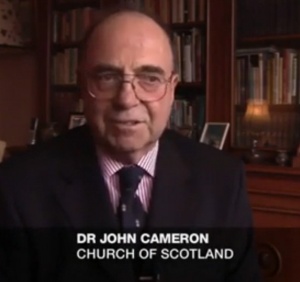
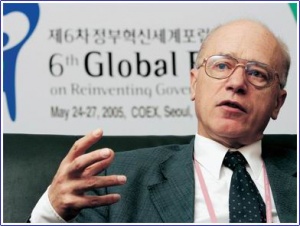
Cameron's Report on Forensic Evidence
- Full article: Cameron's Report on Lockerbie Forensic Evidence
- Full article: Cameron's Report on Lockerbie Forensic Evidence
At the beginning of 2003, former South African president Nelson Mandela asked the Western Christian churches to intervene in what he termed "a clear miscarriage of justice", referring to the conviction of Megrahi at Camp Zeist. In July that year, the Moderator of the General Assembly of the Church of Scotland, Rt Rev Professor Iain Torrance, took up the challenge and appointed the Church of Scotland's leading scientist Dr John Urquhart Cameron to conduct a scientific examination of all the forensic evidence which had convicted Megrahi. As a result, Cameron produced a damning report on the conduct of the forensic experts and on the evidence presented to the trial.[13]
Statement by UN Observer at the Trial
On 23 August 2003, Dr Hans Koechler, the United Nations Observer at the Lockerbie trial in the Netherlands (2000-2002), released a "Statement on the agreement between the United States, the United Kingdom and the Libyan Jamahiriya on the remaining issues relating to the fulfilment of all Security Council resolutions resulting from the bombing of Pan Am Flight 103 over Lockerbie." The Statement concluded:
- "17. The chapter of the Lockerbie investigation can only be closed when the full truth will have been established and when the question will have been satisfactorily answered why only a lone individual has been sentenced in a case that relates to a terrorist crime the commission of which required a vast and sophisticated operational network (most likely involving more than one country and/or terrorist organisation) and huge financial resources. An ambiguous declaration of "state responsibility" such as the one deposited with the UN Security Council does in no way answer the urgent and legitimate question as to personal criminal responsibility of individuals other than Mr Al-Megrahi (and eventually also from other countries) for the Lockerbie crime. A political deal such as the one concluded last week between the US, UK and Libya linking individual compensation with the lifting of multilateral and subsequently unilateral sanctions does not advance the cause of justice in the present case, but is part of the politics of national interest of the countries involved in the present dispute. The intelligence cooperation established between the three countries since September 11, 2001, in the area of counter-terrorism must not come at the expense of the search for truth in the Lockerbie case. The doubts and misgivings about the Lockerbie trial in the Netherlands will only disappear when a full investigation of the crime by an independent commission will have been undertaken. Up to this moment the undersigned will maintain his doubts about the Lockerbie verdict and will consider the judgment concerning Mr Al-Megrahi – on the basis of an Indictment that was substantially modified in the course of the trial and altered by the judges as part of the Verdict – as a miscarriage of justice."[14]
Scottish Criminal Cases Review Commission
On 23 September 2003 lawyers acting for Abdelbaset al-Megrahi applied to the Scottish Criminal Cases Review Commission (SCCRC) for a review of the case (both sentence and conviction), arguing that there had been a miscarriage of justice. On 1 November 2006, Megrahi was reported to have dropped his demand for the new appeal to be held at Camp Zeist.[15] In an interview with The Scotsman newspaper of 31 January 2006, retired Scottish Judge Lord MacLean – one of the three who convicted Megrahi in 2001 – said he believed the SCCRC would return the case for a further appeal against conviction:
- "They can't be working for two years without producing something with which to go to the court."
MacLean added that any new appeal would indicate the flexibility of Scots law, rather than a weakness:
- "It might even be the strength of the system – it is capable of looking at itself subsequently and determining a ground for appeal."
In January 2007, the SCCRC announced that it would issue its decision on Megrahi's case by the end of June 2007.[16] On 9 June 2007 rumours of a possible prisoner swap deal involving Megrahi were strenuously denied by the then Prime Minister, Tony Blair.[17] Later in June, The Observer confirmed the imminence of the SCCRC ruling and reported:
- "Abdelbaset al-Megrahi never wavered in his denial of causing the Lockerbie disaster: now some Scottish legal experts say they believe him."[18]
On 28 June 2007, the SCCRC concluded its four-year review and, having uncovered evidence that a miscarriage of justice could have occurred, the commission granted Megrahi leave to appeal against his Lockerbie bombing conviction for a second time.[19]
In a statement dated 29 June 2007 Dr Hans Köchler, international observer at the Lockerbie trial, expressed his surprise at the SCCRC's narrow focus and apparent bias towards the judicial establishment:
- "In giving exoneration to the police, prosecutors and forensic staff, I think they show their lack of independence. No officials to be blamed, simply a Maltese shopkeeper."[20]
Reliability of Tony Gauci
In 2005, Maltese shopkeeper Tony Gauci was exposed as an unreliable witness by the man who in 1991 indicted Megrahi, former Scottish Lord Advocate Peter Fraser. In Fraser's words, Gauci was "an apple short of a picnic." And yet the judges trusted Gauci's contradictory and confused evidence, and ignored the fact that Gauci was on a promise of a multi-million dollar reward if Al-Megrahi was convicted. Michael Meacher, MP, also alleged bribery of the chief prosecution witness with the collusion of Strathclyde police and the US Authorities, though his blog post was later removed.[21]
Megrahi's release on compassionate grounds
On 20 August 2009, Megrahi's release was authorised by the Scottish Secretary of Justice, Kenny MacAskill under a 1993 Scottish statute enabling the release from prison of anyone deemed by competent medical authority to have three months or less to live.[22] The public were lead to believe that Megrahi had only 3 months to live.
Cable 08LONDON2673 (dated 2008-10-24) from the US Embassy London states however:
- "Megrahi was first diagnosed on 23 September at Inverclyde Royal Hospital, both the FCO and the Scottish Crown office have told us; the second diagnosis was on 10 October. The two diagnoses match: he has prostate cancer that has spread to his bones, the cancer has advanced rapidly, and it is inoperable and incurable. Megrahi could have as long as five years to live, but the average life expectancy of someone of his age with his condition is eighteen months to two years".[23]
Another leaked cable, 09TRIPOLI65 (dated 2009-01-28) from the US Embassy Tripoli reports:
- "The case of convicted Pan Am 103 bomber Abdelbaset al-Megrahi is arguably the regime’s most sensitive political subject, in part because it involves a firm timeline in the form of the ailing al-Megrahi’s approaching death. Through remarks by senior officials suggesting that al-Megrahi is innocent and a steady diet of publicity about his case, the regime has limited its room for political maneuver. U.K. Embassy interlocutors here are planning for a scenario in which the U.K.-Libya Prisoner Transfer Agreement is ratified in early March and the GOL makes application shortly thereafter for al-Megrahi’s transfer to Libya. The U.K. Embassy expects a sharply negative GOL reaction if al-Megrahi dies in prison or if the Scottish Executive and/or FCO oppose his transfer".[24]
Another cable stated that the UK feared action by Libya against British interests if Megrahi died in jail.[25]
Channel 4 news presenter, Jon Snow, wrote that the report of the Scottish Criminal Cases Review Commission "states that after the trial Tony Gauci was paid $2 million, and that brother Paul got $1 million reward money" that after the trial Tony Gauci was paid $2 million, and that brother Paul got $1 million reward money. If true, these would be completely dynamite revelations. Of course, they would have come out in the appeal that Megrahi’s release prevented happening. It is inconceivable that this Scottish Review Commission’s report would not have surfaced at such an appeal. Does this perhaps explain why he was eventually bundled so speedily out of the country?"[26]
In fact, Megrahi died in 20 May 2012, almost three years after his release was authorised.[27]
Namibian Sun spotlights Lockerbie
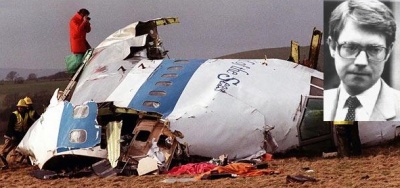
Under the headline "Lockerbie disaster kept Rössing in business", the Namibian Sun newspaper put the spotlight on Bernt Carlsson's targeting in the Lockerbie bombing:
- The bombing of Pan Am Flight 103 over Lockerbie in Scotland on December 21, 1988 had helped to keep Namibia’s Rössing Uranium Mine in business, after a lead investigator into allegations of the illegal exportation of uranium from the then South-West Africa (SWA) perished in the deadly attack.
- Bernt Carlsson, the United Nations (UN) Assistant Secretary-General and UN Commissioner for Namibia at the time, was the highest-profile victim of that bombing, according to a report released this week. The report, compiled by former British diplomat Patrick Haseldine, suggests that Carlsson was the main target of the bombing - in order to end his high-profile investigation into allegations that there was a secret contract and operations arranged by British-based Rio Tinto Zinc Corp to import into Britain uranium (yellowcake) from Rössing in Namibia.
- The dubious extraction of Namibian uranium allegedly happened between 1976 and 1989, which was against a UN decree of 1974 prohibiting the extraction and distribution of any natural resource from the Namibian territory without the explicit permission of the United Nations Council for Namibia (UNCN). The decree - known as Decree No.1 - also provided for the seizure of any illegally exported material, and warned that violators could be held liable for damages.
- "Projected to be Namibia’s largest mining operation, Rössing became the primary target of Decree No. 1," Haseldine’s report reads. "However, many Western governments (including the US and Britain) refused to accept Decree No. 1 as binding, with lawyers and government officials disputing whether the decree was juridically sound, whether and how it might apply, and which courts might enforce its application."
- The report states that Decree No. 1 sparked a lengthy international struggle over the legitimacy of the Rössing Uranium Mine: "The UNCN sent out numerous delegations to convince governments to suspend their dealings with Namibia."
- In 1981, the report further states, SWAPO (which was the liberation movement at the time) helped organise a seminar for West European trade unions as well as presentations on living and working conditions at Rössing and on the mine’s paramilitary security forces, which appealed to the loyalties of the International Socialist movement, where Bernt Carlsson was Secretary-General.
- "The seminar detailed the secret movements of Rössing uranium through European planes, ships, docks, and roads, noting that European transport workers had unknowingly handled barrels of radioactive substances," it reads.
- In May 1985, the UNCN began legal action against URENCO - the joint Dutch/British/West German uranium enrichment company, with plants in Capenhurst (Cheshire, England), Almelo (Netherlands) and Gronau (West Germany). URENCO had been importing uranium ore from Rössing and as a result, it was charged with breaching Decree No. 1.
- "When the case finally reached court in July 1986, the Dutch government took URENCO’s line, claiming not to have known where the uranium had been mined," Haseldine reports. Helmut Angula, SWAPO’s UN representative at the time, even suggested that other companies, such as Shell, De Beers (Consolidated Diamond Mines), Newmont, and Rio Tinto were also likely to face prosecution for breaching the UNCN Decree.
- The British were so fond of Rössing that Prime Minister Margaret Thatcher visited the Rössing Uranium Mine in 1989, accompanied by David Cameron, then a youthful Conservative Central Office researcher. Cameron is current British prime minister.
- Bernt Carlsson became an enemy of many in the West when he spoke about possible prosecutions of those violating the decree – the remarks he made in a World In Action TV documentary "The Case of the Disappearing Diamonds" which was broadcast by Thames Television in September 1987: "The United Nations this year in July started legal action against one such company - the Dutch company URENCO which imports uranium," he said in the TV piece. "All the companies which are carrying out activities in Namibia which have not been authorised by the United Nations are being studied at present." :On December 22, 1988 apartheid South Africa and other negotiating parties signed an independence accord: "It was on his way to the signing of the agreement at UN headquarters in New York, that UN Commissioner for Namibia Bernt Carlsson became the highest profile victim of the Pan Am Flight 103 crash at Lockerbie on 21st December 1988," Haseldine’s report reads.
- Haseldine, a former British diplomat who was dismissed by the then Foreign Secretary, John Major, in August 1989 and often referred to as the "Emeritus Professor of Lockerbie Studies", has called for support of a UN inquiry into the deaths of Bernt Carlsson and former UN Secretary-General Dag Hammarskjöld. In September 1961, a plane carrying Hammarskjöld crashed near Ndola airport in the British protectorate of Northern Rhodesia (now Zambia).
– Additional reporting by Global Research News[28]
Alternative Possibilities
South African Apartheid Regime
President P W Botha ruled apartheid South Africa between 1978 and 1989 and was responsible for gross human rights violations, including all the violence that was sanctioned by the State Security Council (SSC), an executive organ of his apartheid regime. Such violence included using torture, abduction, arson and sabotage, and murdering those opposed to apartheid.[29] An SSC subcommittee, chaired by 'superspy' Major Craig Williamson, targeted anti-apartheid groups and individuals.[30]
From Chequers to Lockerbie
The distance by road from Chequers, the Prime Minister’s country residence in Buckinghamshire, to the site in Scotland of the Pan Am Flight 103 crash on 21 December 1988 is 310 miles. It took more than 4½ years for President P W Botha to complete his murderous journey from meeting Margaret Thatcher at Chequers on 2 June 1984 to the sabotage at Lockerbie.[31]
The full article "From Chequers to Lockerbie" by Patrick Haseldine can be read here.
Ayatollah's Vengeance Exacted by Botha's Regime
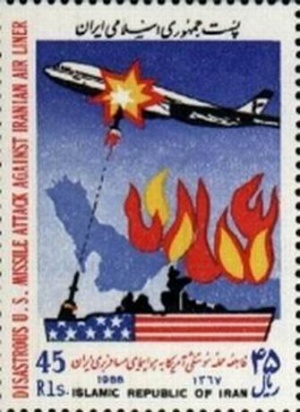
The following is a transcript of Patrick Haseldine's Facebook article published in March 2011:
- On 3 July 1988, the US Navy deliberately shot down Iran Air Flight 655 in the Persian Gulf killing all 290 civilian passengers and crew on the Airbus A300. Iran's Ayatollah Khomeini vowed that the skies would 'rain blood' in revenge. Months passed and no attempt at Iranian retaliation was made, even though there were hundreds of US passenger aircraft worldwide to target each day. A truce had been arranged for the duration of the US presidential election campaign, which ended on 8 November 1988 when Vice President George Bush was elected to succeed the incumbent Ronald Reagan. Thus, nearly six months would elapse before Iran's revenge attack finally happened.
- The eventual target was a Pan American Airways Boeing 747 jumbo jet that was scheduled to depart London's Heathrow Airport on 21 December 1988. Early that morning, South African Airways Flight 234 from Johannesburg carrying an official delegation which included two government ministers landed at Heathrow. The 23-strong party was led by South African Foreign Minister Pik Botha – not to be confused with South Africa’s autocratic President P W Botha – and Defence Minister General Magnus Malan. For over a decade, apartheid South Africa had been defying UN Security Council Resolution 435 by continuing to occupy neighbouring Namibia (which President Botha insisted on calling South-West Africa) and by exploiting its valuable mineral resources in violation of UN law. On 22 December 1988 at UN headquarters in New York Pik Botha would sign an historic agreement bringing an end to the apartheid regime’s occupation of Namibia and handing over control to the United Nations. Seats had been reserved for the South African party on Pan Am Flight 101 which, following a special security check of the aircraft, took off from Heathrow at 11:00hrs GMT. Flight Pan Am 101 landed safely at JFK, New York at 13:45hrs EST.
- In the evening of 21 December 1988, without any security check, Pan Am Flight 103 destined for New York took off from Heathrow at 18:25hrs GMT. Thirty-eight minutes after take-off, Pan Am Flight 103 exploded over Lockerbie in Scotland killing all 259 people on board the aircraft, and eleven in the town of Lockerbie. Iran’s revenge attack thus resulted in 270 fatalities, of whom Assistant Secretary-General of the United Nations, Bernt Carlsson, was the most prominent. It would have been Bernt Carlsson’s responsibility as UN Commissioner for Namibia to take charge of the country as soon as South Africa agreed to cede control on 22 December 1988. Carlsson had already issued a clear warning to the companies and countries that were flouting the UN prohibition on exploiting Namibia’s minerals (especially uranium and diamonds) that he intended to take legal action against them. Iran was one of the countries facing prosecution because, as well as owning 15% of the Rössing Uranium Mine, it was receiving shipments of Namibian uranium to develop its nuclear programme. In targeting Pan Am Flight 103 therefore Iran not only avenged Iran Air Flight 655 but also took out the one individual at the United Nations with the power to prosecute the companies eg Rio Tinto Group (joint owner of the Rössing Uranium Mine) and De Beers (owner of CDM diamond mines) and the countries eg Iran and South Africa that were in breach of UN law.[32]
Q & A Session
Q. Why didn't Pik Botha's party fly South African Airways direct to New York?
A. Because the 1986 US Comprehensive Anti-Apartheid Act banned SAA flights from landing in America.
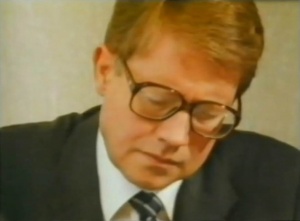
Q. How did the Iranians know that UN Commissioner for Namibia, Bernt Carlsson, would travel on Pan Am Flight 103 of 21 December 1988?
A. They relied on their apartheid South African friends to ensure Carlsson joined that particular flight. He was induced to rearrange his Brussels/New York itinerary, and took a flight from Brussels to Heathrow (arriving by flight BA391 at 11:06hrs on 21 December 1988) for a meeting in London with De Beers, the South African diamond mining and marketing conglomerate. After the meeting, De Beers chauffeured Carlsson back to Heathrow in good time to catch Pan Am Flight 103.
Q. Was it the Iranians or the South Africans that put the bomb in Bernt Carlsson’s checked-in suitcase while it was unsupervised at Heathrow?
A. Masterminded by the apartheid regime's superspy Major Craig Williamson, Iran's revenge attack was carried out by the Europe Branch (based in London) of South Africa’s Civil Cooperation Bureau (CCB), whose operatives substituted the ‘bomb bag’ for Bernt Carlsson’s suitcase at Heathrow Airport. No trace of his suitcase was ever found.
Q. Who supplied the bomb?
A. Marwan Khreesat, a Jordanian double agent who infiltrated the Popular Front for the Liberation of Palestine - General Command (PFLP-GC), told FBI special agent Edward Marshman and forensic investigator Thomas Thurman in 1989 that he had built five barometrically triggered aircraft bombs when he was in Neuss, West Germany in October 1988. German BKA police intercepted four of these devices in November 1988 following the arrest of a PFLP-GC terrorist cell in Neuss. Khreesat said that the fifth bomb had been taken by a senior PFLP-GC agent named Abu Elias, who escaped arrest in Germany. Abu Elias is suspected of supplying the South African CCB with the bomb that brought down Pan Am Flight 103.
Q. How was the bomb transported from Germany to Heathrow?
A. According to Paul Foot's article "Lockerbie: The Flight from Justice": "In August 1997, the German magazine Der Spiegel published a long article about Lockerbie that was completely ignored in the British Press. It cited 'a new witness who has been making detailed statements to the German police and prosecutors.' The man was named as Abolghasem Mesbahi and was described as 'a credible witness.' What he was saying contradicted 'the Anglo-American thesis of the sole involvement of Libya.' Mesbahi’s story was as follows: 'The bomb had been loaded in single pieces at Frankfurt airport into an aeroplane to London. The head of IranAir at Frankfurt at that time, a secret serviceman, had smuggled them past the airport controls. They had then been assembled in London and put on the Pan Am clipper.'
"Despite Der Spiegel’s evidence for the credibility of Mesbahi, and his numerous high-level contacts in Iranian intelligence, this story was quickly and effectively buried."[33]
Q. Was the break-in at Heathrow Airport’s Terminal 3 on 20 December 1988 anything to do with the bombing of Pan Am Flight 103?
A. Possibly. Security guard Ray Manly, who discovered that the padlock had been cut on security door CP2 leading to the Pan Am baggage area, told the Lockerbie appeal court at Camp Zeist in 2002: "I believe it would be possible for an unauthorised person to obtain tags for a particular Pan Am flight and then, having broken the CP2 lock, to have introduced a tagged bag into the baggage build up area." Manly immediately reported the break-in to the police but was not interviewed by the Metropolitan Police until 31 January 1989. No mention of the Heathrow break-in was made at the 2000-2001 Lockerbie trial of the two Libyans Megrahi and Fhimah.
Q. Why wasn’t the bomb timed to go off when the aircraft was over the Atlantic Ocean?
A. The bomb had a barometric detonator and automatically exploded 30 minutes after the aircraft reached a set altitude. Because the aircraft came down on land rather than into the ocean it was demonstrably not an accident (important when revenge is the motive for the bombing).
On 3 March 2011, Oliver Tickell asked three questions:
- Q1. Why did South Africa want to carry out this attack on behalf of Iran?
- Q2. What part did Iran play in the attack?
- Q3. How was this narrative, if true, suppressed?
Patrick Haseldine replied:
- A1. To prevent prosecution by UN Commissioner for Namibia, Bernt Carlsson, for breaching UNCN Decree No 1, the apartheid regime and Iran both wanted Carlsson dead.
- A2. Iran helped in targeting Bernt Carlsson on Pan Am Flight 103.
- A3. It is not for me to speculate how it was suppressed. All I can say is that nothing of mine has been published since 22 December 1993.[34]
High profile victims
- Full article: Bernt Carlsson
- Full article: Bernt Carlsson
Newspaper reports quickly identified the highest profile Pan Am Flight 103 victim as UN Commissioner for Namibia, Bernt Carlsson, who was to have attended a ceremony at United Nations headquarters in New York the next day when South Africa agreed to grant independence to Namibia. However, after a brief spell of attention, this angle of the bombing was not pursued by the commercially-controlled media.
US Intelligence
Four US intelligence agency employees were also aboard, having flown together from Cyprus on flight CY504 which arrived at Heathrow at 14:34:
- Matthew Gannon, the CIA deputy station chief in Beirut, Lebanon[35]
- Major Chuck "Tiny" McKee, US Army Major on secondment to the DIA in Beirut
Two Diplomatic Security Service special agents were acting as bodyguards to Gannon and McKee:
- Ronald LaRiviere, a security officer from the U.S. Embassy in Beirut
- Daniel O'Connor, a security officer from the U.S. Embassy in Nicosia, Cyprus
US Military
Sixteen US military personnel died on Pan Am Flight 103:
- Philip Bergstrom, Army Sergeant
- Willis Coursey, US military
- Joseph Curry, Army Captain
- Edgar Eggleston, Air Force Sergeant
- Kenneth Gibson, Army Specialist
- Lloyd Ludlow, Army Sergeant
- Douglas Malicote, Army Specialist
- Jewel Mitchell, Army 2nd Lieutenant
- Mary Smith, Army Sergeant
- Michael Stinnett, Army Specialist
- Lawanda Thomas, Air Force Sergeant
- Bonnie Williams, US military
- Eric Williams, Army Sergeant
- George Williams, Army 1st Lieutenant
- Dedara Woods, Air Force Sergeant
- Joe Woods, Civilian Military worker[36]
E-petition to HMG
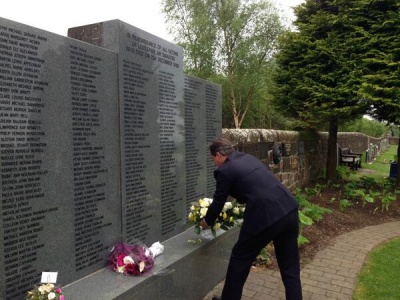
In November 2013, former diplomat Patrick Haseldine created this e-petition calling upon HM Government (Foreign and Commonwealth Office) to:
- "Support a United Nations Inquiry into the deaths of UN Secretary-General Dag Hammarskjöld and UN Assistant Secretary-General Bernt Carlsson"
- On 9 September 2013, the London-based Hammarskjöld Commission reported that there was "significant new evidence" about the plane crash that killed United Nations Secretary-General Dag Hammarskjöld and recommended that the adjourned 1962 UN Inquiry should now be reopened.
- UN Assistant Secretary-General Bernt Carlsson was the highest profile victim on Pan Am Flight 103 which was sabotaged over Lockerbie on 21 December 1988.
- Since Bernt Carlsson's death has never been investigated, the British Government should propose extending the remit of the new UN Inquiry to cover the deaths of both senior diplomats: Dag Hammarskjöld and Bernt Carlsson.
The e-petition was open for signature by UK citizens and residents from 13 November 2013 to 13 May 2014.[37]
On 14 May 2014, Haseldine sent this email to David Cameron via the Prime Minister's Office:
- Dear Prime Minister,
- My e-petition to HM Government had 56 signers when it closed yesterday. That petition requested HMG to "Support a United Nations Inquiry into the deaths of UN Secretary-General Dag Hammarskjöld and UN Assistant Sec-Gen Bernt Carlsson".
- On 13 May 2014, I created four new e-petitions each calling on you to "Open all MI6 files on state sponsored murders":
- 1. http://www.thepetitionsite.com/859/022/615/open-all-mi6-files-on-state-sponsored-murders/
- 2. http://www.change.org/en-GB/petitions/prime-minister-david-cameron-open-all-mi6-files-on-state-sponsored-murders/
- 3. https://you.38degrees.org.uk/petitions/open-all-mi6-files-on-state-sponsored-murders/
- 4. https://secure.avaaz.org/en/petition/Prime_Minister_David_Cameron_Open_all_MI6_files_on_state_sponsored_murders/
- I hope you can agree to open these MI6 files to assist the UN in its reopened investigation.
- Patrick Haseldine
- Emeritus Professor of Lockerbie Studies
Media cover-up
- Full article: Lockerbie Bombing/Cover-up
- Full article: Lockerbie Bombing/Cover-up
Within a few weeks of those December 1988 newspaper reports, Bernt Carlsson's name would hardly ever be mentioned again by the commercially-controlled media in the Lockerbie context. He rapidly became a "nonperson", whose death was never properly investigated. Patrick Haseldine alleges that Tiny Rowland recruited Emeritus Professor of Scots Law Robert Black to organise the British news blackout and that "for the past 20 years, Professor Robert Black has been suppressing the truth about the Lockerbie disaster".[38]
A Pan Am Flight 103 victim on Wikispooks
| Title | Description |
|---|---|
| Matthew Gannon | CIA officer killed in the Lockerbie Bombing |
Related Documents
| Title | Type | Publication date | Author(s) | Description |
|---|---|---|---|---|
| Document:Call for US to give update on fourth Lockerbie suspect | Article | 18 December 2022 | Kathleen Nutt | Former Justice Secretary Kenny MacAskill: "Britain and America know everything. I want the UK and US to be more open. Libya have offered up Abu Agila Masud. But Masud is smaller beer. The Lord Advocate should find out what progress is being made on bringing Abdullah Senussi to court." |
| Document:Did German bungling lead to Pan Am 103? | Article | 24 September 1989 | Gavin Hewitt | The blunders of "Operation Autumn Leaves" didn't end with the case of Marwan Khreesat. One of those arrested in the 26 October 1988 sweep was a Palestinian by the name of "Ramzi Diab" which was not his real name, it turned out. That name had been taken from an Israeli passport stolen in Spain. The German police suspect he may actually have transported the Lockerbie bomb. |
| Document:Fragments of Truth | Article | 1 December 2009 | Mark Hirst | |
| Document:Libya: Fine, but why Britain | article | 20 March 2011 | Brian Barder | David Cameron seemingly Gung Ho on toppling the Libyan leader, Muammar Gaddafi, while Barack Obama takes a back seat |
| Document:Lockerbie - Bomber, Bomber, Bomber | article | 21 July 2010 | Steven Raeburn | |
| Document:Lockerbie - The Syrian Connection | article | 1997 | David Guyatt | |
| Document:Lockerbie Bombing and my Reinstatement in HM Diplomatic Service | letter | 29 January 1997 | Patrick Haseldine | Former diplomat Patrick Haseldine writes to former Prime Minister James Callaghan |
| Document:Lockerbie Lies | Article | 22 December 2017 | Steven Walker | The Lockerbie bombing remains a text book case of a terrible tragedy causing considerable pain and suffering to relatives whose search for answers and clarification about why and how their loved ones died have taken second place to geo-political manoeuvres, deliberate meddling in legal processes, and the murky world of secret service wheeling and dealing on behalf of governments with no respect for human decency. |
| Document:Pan Am Flight 103: It was the Uranium | article | 6 January 2014 | Patrick Haseldine | Following Bernt Carlsson's untimely death in the Lockerbie bombing, the UN Council for Namibia inexplicably dropped the case against Britain's URENCO for illegally importing yellowcake from the Rössing Uranium Mine in Namibia. |
| Document:PanAm-Rätsel LOCKERBIE: Es war Südafrika!…so wie bei Olof Palme | Article | 6 October 1996 | Kurt Seinitz | "It would have been easy for South African secret service agents, who had infiltrated Sweden's anti-apartheid movement, to exchange Carlsson's tape recorder in a hotel room against one containing the bomb. And then placing it inside one of those 'ubiquitous' Samsonite suitcases, so beloved by the peripatetic Bernt Carlsson." |
| Document:Reinstatement in HM Diplomatic Service | Letter | 6 January 1997 | Patrick Haseldine | A plea for reinstatement in the Foreign and Commonwealth Office by "Thatcher's Whitehall Critic" |
| Document:Release of the Lockerbie Prisoner | report | 21 August 2009 | Hans Köchler | A report by the official UN Observer of the Lockerbie Trial in the Netherlands, commenting on the release on compassionate grounds of the only person convicted in the Lockerbie case. |
| Document:South Africa Minister Denies Knowing Of Lockerbie Bomb | Abstract | 12 November 1994 | David Tucker | Having confirmed that South African foreign minister Pik Botha and his 22-strong party had been booked on Pan Am Flight 103 but switched flights after arriving early in London from Johannesburg, spokesman Roland Darroll said: "The minister is flattered by the allegation of near-omniscience." |
| Document:Targeting of Bernt Carlsson on Pan Am Flight 103 | Letter | 17 February 2023 | Patrick Haseldine | Ian Ferguson: "In the early stages of the Lockerbie investigation, Bernt Carlsson's Presikhaaf suitcase was seen as the more likely bomb case. Police sources at the time said that this case was cleared of being the suspect case on November 23rd 1989." |
| Document:The Crime of Lockerbie | Article | 16 August 2009 | Tam Dalyell | Tam Dalyell said: "Yes, I have read 'The Downing Street Years' very carefully. Why in 800 pages did you not mention Lockerbie once?" Mrs Thatcher replied: "Because I didn’t know what happened and I don’t write about things that I don’t know about." |
| Document:The Rossing File:The Inside Story of Britain's Secret Contract for Namibian Uranium | pamphlet | 1980 | Alun Roberts | Scandal in the 1970s and 1980s of collusion by successive British governments with the mining conglomerate Rio Tinto to import yellowcake from the Rössing Uranium Mine in Namibia (illegally occupied by apartheid South Africa) in defiance of international law, and leading to the targeting of UN Commissioner for Namibia Bernt Carlsson on Pan Am Flight 103 in December 1988. |
| Document:Unanswered questions over Lockerbie | Article | January 1995 | Phil Johnson | According to Tam Dalyell MP: "The American and British governments do not want the film shown. The American families do not want the film shown because they want their compensation money ($2.7 billion). More importantly, their lawyers want their money ($810 million)." |
| File:A Tale of Three Atrocities.pdf | report | August 2009 | Charles Norrie | The report suggests that three ostensibly unconnected flight sabotages may in fact be connected. The main focus is the Pan American Airlines Flight 103, downed over Lockerbie in December 1988. It suggested that the CIA facilitated the Lockerbie atrocity by Iranian operatives as a quid-pro-quo for the downing of the Iranian airliner some 5 months earlier. |
| Document:"Setting Up" Libya For The Lockerbie Bombing - Part 2 | webpage | 15 September 2004 | Joe Vialls | |
| Document:The Canadian Connection To Lockerbie & Pan Am 103 | webpage | 14 February 1998 | Joe Vialls | |
| Document:The Bomb Trigger on Pam Am 103 | webpage | May 2002 | Joe Vialls | |
| Document:Setting Up" Libya For The Lockerbie Bombing - Part 1 | webpage | 15 September 2004 | Joe Vialls |
The Official Culprit
| Name |
|---|
| Abdelbaset al-Megrahi |
See also
On WikiSpooks
- The How, Why and Who of Pan Am Flight 103
- UN Report on the first Lockerbie case appeal Professor Hans Koechler Vienna 26 March 2002
- How Megrahi and Libya were framed for Lockerbie - Alexander Cockburn in "The First Post" July 2010
- The Lockerbie case and the corruption of justice - Dr Hans Koechler
External sites
- Highly Recommended - The Herald, Scotland - Lockerbie archive - A substantial Establishment-sceptic resource.
- Highly Recommended - - ohmynews - list of articles on the Lockerbie Bombing
- Scottish Law Reporter. Lockerbie pages
- Lockerbie - The evidence
- Flight From the Truth - The Guardian 27 June 2001
- Jim Swire's Web Site
- Facebook group: U.N. must investigate the targeting of Bernt Carlsson on Pan Am Flight 103
- 'Lockerbie Conspiracy' by Thatcher and Reagan
- Lockerbie: Apartheid General Targeted UN Commissioner
- Pan Am Flight 103: Why has it taken so Long for the finger of suspicion to point towards South Africa?
- Lockerbie Bombing: The 'Finnish' Question
- Bernt Carlsson in Secret Meeting with 'Pressuriser' from the Diamond Cartel
- Major Craig Williamson: the 'real' Lockerbie bomber
- Gordon Brown says Lockerbie victim Bernt Carlsson was the target
- Lost on Flight 103: A Hero to the Wretched of the World
- Bernt Carlsson: A Very Private Public Servant
- Dr Jim Swire petitioned PM to compensate Lockerbie campaigner Patrick Haseldine
- Professor Robert Black's Blog
- Comments from Patrick Haseldine on Robert Black's Blog - 6 October 2009
- Crown Fights to keep 48 pieces of evidence secret - Glasgow Herald 19 February 2010
- Questions remain over Lockerbie - Guardian letters 23 July 2010
- Lockerbie witness 'put up for reward'
- Lockerbie Bombing Case Faces U-Turn after Perjury Confession - Sofia News Agency 20 August 2007
- UN Claims Lockerbie Trial Was Rigged - Common Dreams 8 April 2001 from The Glasgow Herald
Video
- Lockerbie Lies - A Youtube video featuring Professor Robert Black who was largely responsible for the setup of the Camp Zeist trial and believes that Megrahi would be acquitted in any retrial.
- "The Lockerbie Bombing - Pan Am Flight 103" Al-Jazeera TV documentary featuring Professor Robert Black and Dr John Cameron.
References
- ↑ "UN monitor decries Lockerbie judgement"
- ↑ File:SCCRC-Lockerbie.pdf - SCCRC Leave to appeal decision press release - June 2007
- ↑ "Lockerbie bomber's appeal dropped"
- ↑ "Flight 103: it was the Uranium"
- ↑ "Take action to investigate the deaths of UN Officials Dag Hammarskjöld and Bernt Carlsson!"
- ↑ "AAIB report on the accident to Boeing 747-121, N739PA at Lockerbie, Dumfriesshire, Scotland on 21 December 1988"
- ↑ Sheriff Principal John S Mowat's Fatal Accident Inquiry into the Lockerbie Disaster"
- ↑ "Lockerbie - The Heathrow Evidence"
- ↑ "A good man, a smear, and the Crown Office"
- ↑ "The Lockerbie Trial" by Rt Hon Colin Boyd QC, Lord Advocate, Scotland
- ↑ "Up in the air?" The Michigan Daily, 14 February 1989
- ↑ "Full wording of initial charges"
- ↑ "Lockerbie: Mandela and Dr John Cameron's Report"
- ↑ "Statement by Hans Koechler, UN Observer at the Lockerbie Trial" 23 August 2003
- ↑ "Appeal can be held in Edinburgh"
- ↑ "SCCRC ruling by the end of June 2007"
- ↑ "PM says no deal over Megrahi"
- ↑ "Evidence that casts doubt on who brought down Flight 103"
- ↑ "SCCRC referral of Megrahi case"
- ↑ "Statement by Dr Hans Köchler"
- ↑ "Lockerbie: The Truth is finally coming out" - The now removed post by Michael Meacher MP on his blog, reposted on Robert Black's blog.
- ↑ "Lockerbie bomber released: Kenny MacAskill's full statement"
- ↑ "08LONDON2673: PAN AM 103 BOMBER HAS INCURABLE CANCER; LIBYANS"
- ↑ "09TRIPOLI65: PAN AM BOMBER AL-MEGRAHI: THE VIEW FROM TRIPOLI"
- ↑ "WikiLeaks cables: Lockerbie bomber freed after Gaddafi's 'thuggish' threats"
- ↑ "Bribery at the heart of Megrahi's Lockerbie conviction"
- ↑ "Lockerbie bomber Abdelbaset al-Megrahi dies in Tripoli", BBC
- ↑ "Lockerbie disaster kept Rössing in business"
- ↑ "South African Truth and Reconciliation Commission"
- ↑ "Interview with SA 'superspy' Craig Williamson"
- ↑ "Botha 'linked to murder decisions'"
- ↑ "Lockerbie: Ayatollah's Vengeance Exacted by Botha's Regime"
- ↑ "Lockerbie: The Flight from Justice"
- ↑ "Flight path"
- ↑ "EverythingPanAm.com The Virtual Pan Am Museum". Retrieved 21 August 2009.Page Module:Citation/CS1/styles.css must have content model "Sanitized CSS" for TemplateStyles (current model is "Scribunto").
- ↑ "Victims of Pan Am Flight 103"
- ↑ E-petition to HM Government
- ↑ "Blackout over Lockerbie"
